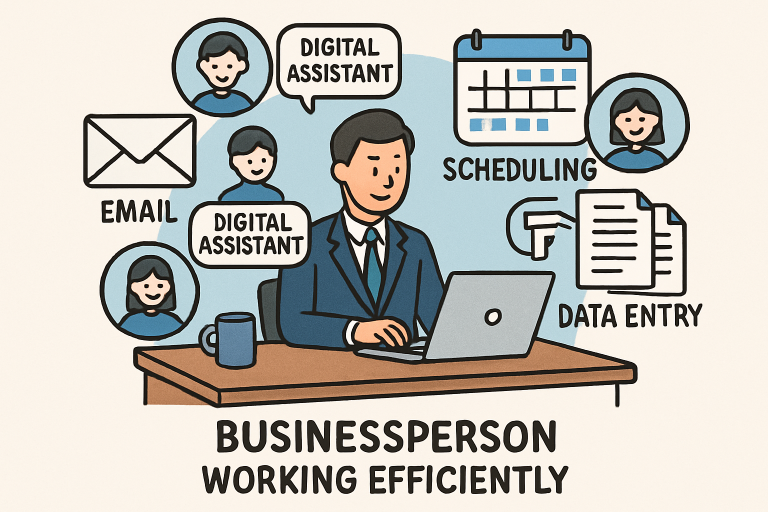Remote Work Evolution: Utilizing Virtual Assistants Effectively
The emergence of virtual assistants (VAs) is reshaping modern workplaces, ushering in unprecedented productivity and efficiency gains for organizations of every size. More than just a trend, virtual assistants are now central to how businesses delegate tasks and optimize workflows. As remote work and digital transformation accelerate, more companies are relying on a high quality VA agency to manage both routine and mission-critical operations efficiently. This shift lets professionals direct their energy toward innovation and strategic growth rather than getting bogged down by administrative burdens.
Virtual assistants aren’t just a cost-saving tool but key contributors to agile teams and dynamic business models. Their adaptability and diverse skill sets make them invaluable for companies aiming to stay competitive in an ever-changing business landscape. With customer expectations rising and operational costs under scrutiny, VAs offer a compelling solution for businesses seeking agility and excellence.
Streamlining Administrative Tasks
Administrative overhead can drain valuable time and creativity from teams. Virtual assistants excel at taking over labor-intensive, repetitive tasks like inbox management, appointment scheduling, data entry, and file organization. Delegating these functions to skilled VAs ensures that knowledge workers and decision-makers stay laser-focused on projects that move the business forward. This not only optimizes productivity but also minimizes the risks of human error and burnout. Forbes recognizes that delegating administrative tasks is often the first—and most impactful—step leaders can take when streamlining operations.
Additionally, with the increasing sophistication of VA technology and training, these professionals now handle tasks ranging from travel arrangements to expense tracking, making it easier than ever to create efficient, paperless workflows. The immediate access to skilled support helps businesses operate seamlessly across different time zones and industries, expanding productivity beyond traditional office hours.

Cost-Effective Solutions
Hiring full-time, in-house staff often requires businesses to shoulder considerable ongoing expenses, including salaries, health benefits, retirement contributions, office space, and necessary equipment. These costs quickly add up, particularly for small and mid-sized organizations aiming to remain agile. In contrast, virtual assistants can be engaged at a fraction of that cost, offering immediate flexibility. By reducing reliance on permanent hires, companies can redirect valuable resources toward innovation, customer acquisition, and other growth initiatives instead of overhead. Reports such as those from Business News Daily highlight that many organizations utilizing VAs see significant reductions in operational spend without sacrificing service quality. Another advantage lies in scalability: businesses only pay for the hours worked or tasks completed, ensuring efficiency. This model is well-suited for diverse needs, from daily administrative support to project-based assistance, enabling firms to adapt quickly to seasonal demands without long-term commitments.
Flexibility and Scalability
One of the greatest advantages of virtual assistants is their ability to scale with the needs of a business. Whether a company expects rapid growth, sudden workload spikes, or needs temporary support to meet project deadlines, VAs can quickly adapt. This agility is especially beneficial for startups, solopreneurs, and small businesses looking to maximize efficiency while staying lean.
Virtual assistants also provide specialized expertise in fields like digital marketing, social media management, bookkeeping, and tech support. This allows businesses to tap into a global talent pool, gaining exactly the skills required—right when they’re most needed—without costly recruitment processes or long-term commitments. The resulting workforce is not only flexible but also truly world-class.
Enhancing Customer Service
Companies recognize customer service as a critical differentiator, and virtual assistants are at the forefront of delivering exceptional client experiences. By leveraging human expertise and artificial intelligence, VAs ensure that inquiries are addressed promptly, support is available 24/7, and clients receive personalized attention. According to CNBC, AI-powered assistants enable businesses to meet evolving customer expectations, resolving issues faster and with greater satisfaction.
Maintaining consistent and empathetic communication helps cultivate long-term relationships and fosters client loyalty. With their capacity to escalate complex demands and proactively follow up, VAs play a significant role in protecting a company’s reputation in a hyper-competitive market.
Improving Work-Life Balance
Unchecked workloads and mounting obligations are major contributors to professional burnout. By outsourcing non-core tasks, teams and leaders reclaim time for strategic work, creative thinking, and personal growth. This task redistribution not only increases morale but also leads to a healthier, more sustainable approach to work.
When VAs handle routine correspondence, administrative details, and project coordination, staff are less likely to face time crunches or overtime. The outcome is greater productivity during work hours and a better alignment of professional and personal life—key factors in talent retention and overall workplace satisfaction.
Conclusion
As technology advances and remote work becomes more deeply ingrained in professional culture, virtual assistants (VAs) are taking on an increasingly pivotal role in shaping how modern businesses operate. Handling various administrative, technical, and customer-focused tasks allows companies to streamline daily operations and allocate resources more efficiently. This reduces overhead costs and creates a more agile structure capable of responding quickly to shifting demands. VAs enhance flexibility by offering scalable support that adapts to business growth or seasonal fluctuations, ensuring continuity without the burden of permanent staffing. Beyond operational efficiency, their contribution to improved customer service fosters stronger client relationships and brand trust. Additionally, VAs support a healthier work-life balance for business leaders and employees alike, ultimately redefining expectations and setting new standards for productivity and workplace resilience.
Visit the rest of the site for more interesting and useful articles.

